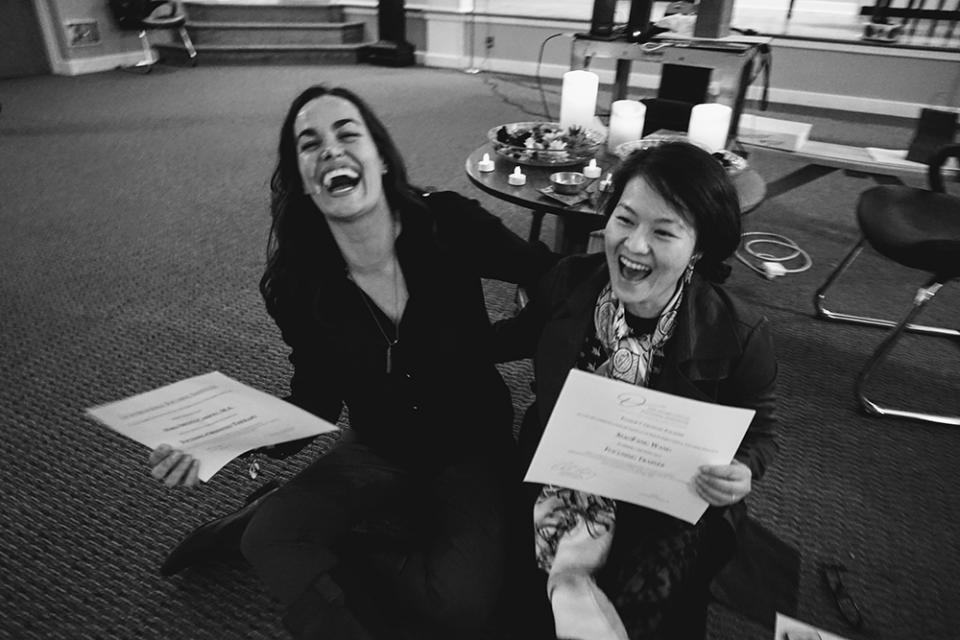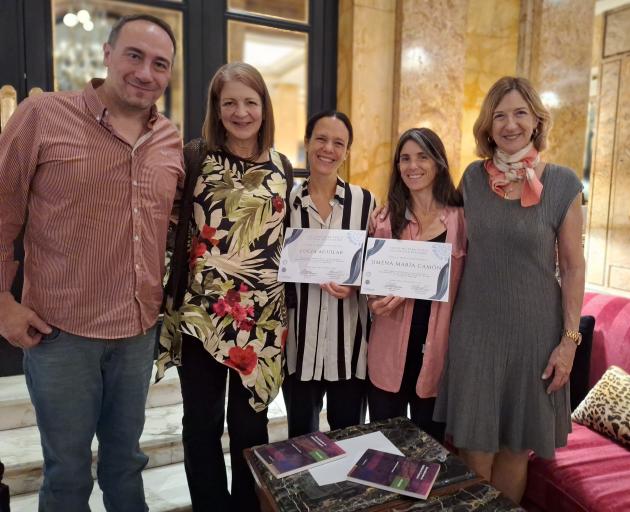Italian translation of this page (June 2021)
Certificates Awarded By The International Focusing Institute
SEE Certificate Types >>
ELIGIBILITY TO BECOME A CERTIFIED FOCUSING PROFESSIONAL
Becoming a Certified Focusing Professional (Trainer) is a possibility for someone from any walk of life. You do not need to be a therapist or have other formal credentials. This is a human process open to any person. Focusing joins naturally with any kind of work in which you are attending to an ongoing process.
You might be an entrepreneur, a lawyer, a nurse, a doctor, a massage therapist, a child care worker, a teacher, a home schooling parent, a secretary, a manager, a clergyperson, a hospice worker, a designer, a homemaker, a retired person. Even if you start out learning Focusing so that you can use it in your own work life, you may find as you begin to apply it that you have a growing desire to teach it to others. For instance, a therapist may originally learn Focusing to use with their own clients, and later begin to see that they could train other therapists in their agency to use Focusing in their work as well.
The skills that are necessary for certification can be found under Focusing Proficiency.
THE PROCESS OF CERTIFICATION
Please note If you are a therapist (or in a similar profession such as life coach or religious leader) the therapist training track might be right for you.
See Focusing-Oriented Therapist Training Track >>
Focusing is a level of human process rather than simply a technique, and so it is the nature of the Focusing process to respond to each situation freshly. For this reason, our certification processes allows for individualized learning. Your process of reaching the level of Certified Focusing Professional (Trainer) will arise out of your Coordinator's own expertise and Felt Sense of what is needed. We have Core Proficiencies that should be achieved during training, but we allow our Coordinators to design teaching around the specific needs of the learner. Some Coordinators have very set patterns of working with their students; others do not. What one teacher calls a "Level Two" course may be quite different from what another teacher calls a "Level Two." As you are considering which Coordinator to work with, be sure you ask about their approach and ask them to describe how their approach might differ from other approaches. Consider talking to at least one other Coordinator to ask similar questions so that you will find someone whose style and expectations are aligned with your felt need.
Step One: Learn To do Focusing
You start by learning Focusing. The International Focusing Institute offers many opportunities for you to begin to learn Focusing, but once you decide to go deeper, you will want to find a Certified Focusing Professional to work with. Any CFP can award you up to a Proficiency in Focusing Partnership (PFP). The PFP award is often a first step before certification, but is not required.
Step Two: Find a Coordinator
When you decide would like to become certified, you will need to have further training with a Coordinator. Many Coordinators teach through Zoom or Skype, or you might want to find one who lives close to you. You'll find the list of over 200 Coordinators worldwide on the Find a Focusing Professional on our homepage. Limit the search to Coordinators. (You can limit the search further, but if you limit it too much, you might not find any results. Begin with Coordinators and not more than one other limit to your search.) The reasons you might choose a particular Coordinator could include: geographical proximity, a particular specialty, or simply personal preference (for instance, you took a workshop with them and felt comfortable).
Contact the people you might like to work with, and find out what they need in order to know you well enough to accept you in training. Find out each Coordinator's requirements and needs, and let each know what you are hoping for from training. Find out the fees you will be expected to pay. Both you and the Coordinator need to feel confident that you are ready for training, and that you are a good fit as Coordinator and student, before you are accepted as a student. Discuss your interests, and your needs for the training process, as you think together about your readiness to work towards certification as a Certified Focusing Professional/Trainer. If you both agree that you are ready, and that you would like to work together as Coordinator and student, then this Coordinator can become your mentor.
Each Coordinator is empowered to create a training program by his or her own standards and beliefs. Thus, each Coordinator's program will be somewhat different, and will usually be a flexible program responsive to your needs and interests.. We consider this a positive benefit of the Focusing philosophy of seeking each person's inner sense of rightness.
Individual Coordinators' programs almost always include these elements at their core:
- The requirement to maintain an ongoing Focusing partnership, in person or by phone,
- Taking courses; assisting your Coordinator or other Trainers in teaching workshops; and being supervised in your own work with Focusing clients.
Step Three: Become A Trainee
We hope you're already a member of the Institute; when you begin your training toward certification, please change your membership status to "Trainee," so that you are on track for certification.
Step Four: Attend the Weeklong for Advanced Focusers if possible
Every year, we offer the Weeklong for Advanced Focusers. As the name indicates, it is for advanced Focusers and those who are soon to be certified or have been certified. There is a lovely certification ceremony as part of the week. Attendance at the Weeklong is an opportunity to fully immerse yourself in the global Focusing community. The Weeklongs are now done in a hybrid fashion. This means that you can attend online and have a full, rich experience, or you can choose to attend in person. Those attending in person go online for 2-3 hours each day to attend alongside those who are online only. The Dr. Janet Klein scholarship is awarded each year to participants who couldn't otherwise attend. There is more information about this scholarship at the Weeklong web page. Finally, to encourage Coordinators to attend, we offer Coordinators special discounts. Contact the Institute for more information if you have questions about any of these options.
Step Five: Receive certification through The International Focusing Institute
Upon completion of your program, your Coordinator will recommend you for certification. Once you have been recommended, you pay your certification fee to The International Focusing Institute. We mail your certificate to your Coordinator, who signs it and gives it to you.
When you receive your certificate, you may call yourself a Certified Focusing Professional (also called a CFP or Trainer -- the terms are equivalent). You will be listed in The International Focusing Institute Directory and on our website, and you will appear on the list of CFPs/Trainers sent to anyone in your area who asks for referrals, as long as you remain a member in good standing. As a Trainer, you are encouraged to help people in your area and in your working community become familiar with Focusing. Please contact us at the Institute if you want help with how to further your work as a CFP/Trainer; we are here to help!
Maintaining Your Certification
In order to maintain your membership as a Focusing Professional, you will need to meet the following conditions:
- Maintain high ethical standards of honesty and confidentiality at all times.
- Pay to The International Focusing Institute (TIFI) a one-time certification fee
- Maintain your relationship to TIFI and contribute to the professional development of yourself and others by participating in TIFI-sponsored classes, conferences, meetings and events.
- In order to maintain your listing with us as a Certified Focusing Professional, pay membership fees to the Institute.
Statement on Diversity of Approaches (Approved By Board In 2021)
Focusing and Thinking at the Edge always honor what arises freshly in the moment. Frozen structures are antithetical to the ethic of felt sensing. Focusing and Thinking at the Edge and how they are taught by our certified teachers will not be standardized. It is a core value of TIFI that diversity of approaches will be protected. Constructive critiques are welcome among our teachers or between TIFI and individuals presenting or applying practices which arise from Gendlin’s philosophy of the implicit. These should be offered by means of open, respectful communication. TIFI itself will seek to honor the value of diversity of approaches in its offerings.


